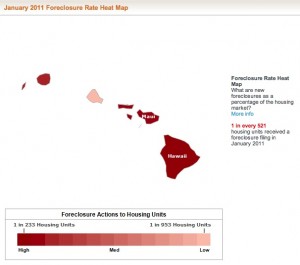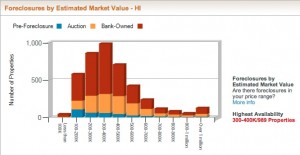I read an interesting article in yesterday’s Honolulu Star-Advertiser (I still keep screwing up the name since the merger). It discussed the possibility of a five-month moratorium on Hawaii foreclosures statewide. Immediately my brain started working overdrive trying to come up with the possible scenarios that could unfold from this course of action. My final take is that I think it is ultimately misguided. A foreclosure moratorium is based on the idea that there are mortgages being foreclosed upon that should not happen. A typical foreclosure occurs when the homeowner generally:
1. didn’t qualify for a loan modification
2. fell out of loan mod status
3. could not refinance
4. made no attempt to reinstate the loan with back payments
5. could not afford modified loan payments
6. could not successfully complete a short sale
7. made no attempt to do anything
8. just could no longer afford the payments for any other reason (payments spiked, job loss, etc.)
Now an improper foreclosure, like the kind I’m assuming to be the target of a moratorium, would be one where:
1. the lender failed to accept a reasonable short sale offer
2. the lender failed to properly process a short sale or loan modification package (fairly common with the bureaucracies and size of lender’s processing departments)
3. the lender realized they would make more money on a foreclosure than by working with the homeowner on a short sale or loan modification
4. homeowner could not get any reasonable form of customer service while the property was simultaneously headed to trustee sale
Of course, this is not an exhaustive list, but it makes a point. And that point is that nowhere in this second list does it mention improper foreclosure proceedings when the homeowner missed payments. The bottom line is that if you miss payments because you can’t afford your mortgage, then you’ll be in default and likely experience a foreclosure barring mitigative action. There’s nothing hazy about that. This takes us back to the robo-signing scandal of last fall when people were up in arms over the process but not the guidelines, yet spoke of it the other way around.
So What Does This Really Mean?
Now that being said, I’ve no doubt that truly improper foreclosures happen in Hawaii from time to time (as in other states), and my sympathy goes out to those homeowners. However, the bigger picture here is that those instances are few and far between. Would a moratorium stop even these rare instances from happening? Not necessarily — and only if something productive comes out of it. Right now I haven’t heard what would happen in those five months to justify its passing.
What is likely to happen, though, is that the backlog of distressed inventory grows even further. Again, these are properties that are assumed to have been legitimately foreclosed upon, i.e. the homeowner missed payments and the house proceeded toward a trustee sale. Remember, not all of Hawaii’s distressed inventory is on the market yet — there is plenty of real estate that the banks have taken back but have yet to put back on the MLS or general market for sale. Releasing too much of this at once will increase supply and effectively bring down neighborhood values and reduce their ability to recoup losses.
So if we already have a sizable backlog of real estate in the pipeline, do we want to stop the pipe from flowing altogether for five months or keep it flowing so that we can process it all and get every bit closer to a healthy Hawaii real estate market? By most counts, it’s going to take 1-2 years as it is without any intervention. RealtyTrac just released statistics that puts Hawaii #11 nationwide for foreclosure filings per housing unit. It’s foolish to think this is a result of improper foreclosure decisions; it’s instead a result of people just not being able to afford their mortgage any longer because of the general hard knocks in life.
However, some of the other propositions being thrown around have some possible merit. I’m particularly interested in the one that gives the mortgagor the option of a face-to-face meeting with the lender. To me, this could go great lengths to reducing true improper foreclosures. There’s also the idea of a homeowner option of converting a non-judicial foreclosure (the most common type in Hawaii) to a judicial foreclosure. That has some potential as well, though it would need certain checks and balances so as to prevent a swarming of the courts.
Ultimately, we need a solution that will give homeowners a better option to fight truly illegal foreclosures but one that doesn’t bring the whole thing to a screeching halt.
What are your thoughts? Is a foreclosure moratorium in the best interest of Hawaii? Or does it move us further away from where we need to be?



